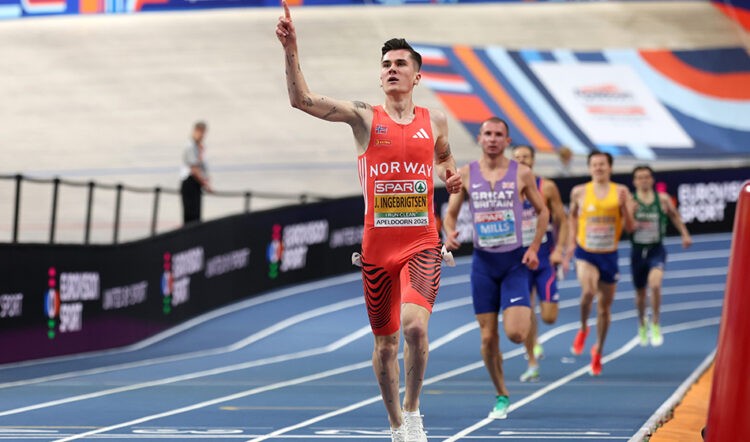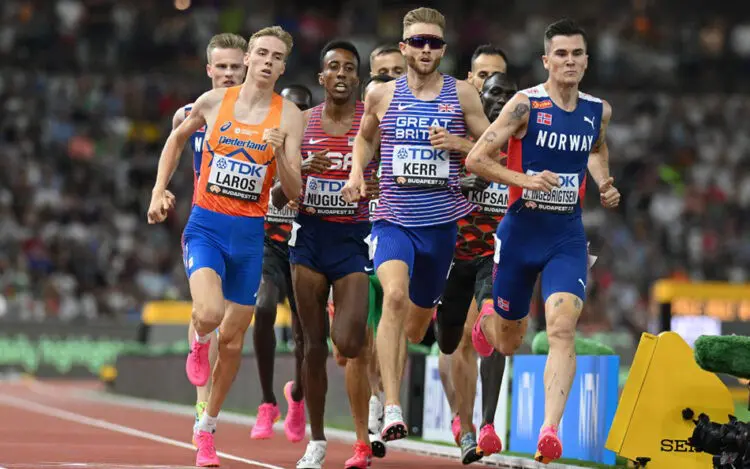Defending 5000m world champion admits he has his work cut out after injury woes, but insists he will still be a force to be reckoned with if he makes it to the Tokyo start line
Jakob Ingebrigtsen has admitted that he’s “racing against the clock to make the world championships” in Tokyo later this month. However, the two-time defending 5000m champion added: “If I'm on the start line, I know that I'm a gold candidate.”
After a brilliant indoor season that saw him complete world and European 1500m and 3000m doubles, the recurrence of an Achilles problem that first surfaced last year has forced the 5000m Olympic gold medallist to sit on the sidelines for the entirety of the summer thus far and he has yet to race outdoors in 2025.
Ingebrigtsen is very much back in training and has been named in the Norwegian world championships team to compete in both the 1500m and 5000m. He has never been one to shy away from a challenge but, while he is seeing progress on a daily basis, the 24-year-old knows he is facing a tall order in the Japanese capital.
“This season has been pretty miserable on my side,” he said, speaking during a video call with the world’s media. “This is more or less the worst case scenario for me, because I have had to sit home and watch the whole season go on. I'm a competitor and, to compete, you need to participate.
“I'm definitely racing against the clock to make the world championships but, at the same time, if I'm on the start line, of course I'm going try to win and believe that I can win.
“I'm definitely improving quite a lot, day by day and [for] the last couple of weeks it’s been significantly better than the rest of the summer so there's definitely some hope. But still it's taking it day by day and maximising the effort that I can for the last week or so leading into the world championships.”
Ingebrigtsen has until the morning session of September 14 – when the men’s 1500m heats get under way – to be ready and he insists that, even with his less than perfect build-up, he won’t be changing the forceful style that has brought him so much success in the past.

“I think every approach is going to be different in every race [but] at the same time it's usually the same athletes that I've been facing over the last five, six years, so there's some sense of familiarity in the competition itself,” he said. “At the same time, it's all about myself and my own preparations and improvements. But if I'm on a start line with a bib on my chest and spikes on my feet, I'm going to do what I've always done and take the same approach that I've always had.”
In Tokyo, Ingebrigsten will be returning to the site of his 1500m Olympic victory in 2021, but he is yet to strike gold over the distance at an outdoor world championships. He was fourth in the 2019 final in Doha, before having to settle for second place behind Jake Wightman in 2022 and then Josh Kerr in Budapest one year later.
As well as Kerr, the American champion Josh Hoey and Olympic champion Cole Hocker, there are newer threats on the horizon, too, such as the exciting young Dutch talent Niels Laros and Kenyan teenager Phanuel Koech.
It’s clear that Ingebrigtsen has dearly missed the cut and thrust of competition and sizing up the opposition, but he has used his rehabilitation to help as an outlet for that competitive drive.

“I am competing every day, and I've been competing my whole life in one way or another,” he added. “Running is very tough. It's a very brutal exercise, because you can only run so much in a week or you're going to get injured. But if you're aqua jogging, you don't have the same load and the same fatigue that you usually have so you can more or less go as hard as you can for as long as you can so it only comes down to your mental strength, or your motivation.
“That's been my competition. ‘How long can I go today without stopping? How fast can I go? Which heart rate can I achieve?’. I've tried to push my alternative training as much as I can, but that also has been quite beneficial when I'm able to get back to running because, fitness wise, I'm in a relatively good place.
“At the same time, there's nothing [like] running on the biggest stage, which is obviously why I'm doing this, and many of my competitors are doing it, because we love the competition aspect. We love chasing victories and chasing the competition itself, fighting against the best runners in the world.
“That's been something that I've been able to do consistently for many, many years and going a long period without it, this is definitely something that's missing, but that's why I was very motivated to get back and to do what was needed of me.”
